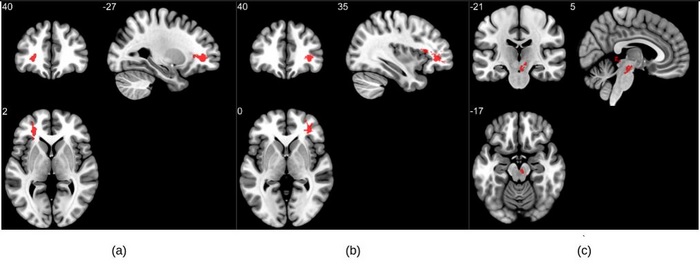Using a special type of MRI, researchers have discovered brain changes in patients up to six months after they recovered from COVID-19, according to a study to be presented next week at the annual meeting of the Radiological Society of North America. (RSNA).
About one in five adults will develop long-term effects from COVID-19, according to the U.S. Centers for Disease Control and Prevention. Neurological symptoms associated with long COVID include difficulty thinking or concentrating, headache, trouble sleeping, lightheadedness, tingling sensations, changes in smell or taste, and depression or anxiety. However, studies have found that COVID-19 may be associated with changes in the heart, lungs or other organs, even in asymptomatic patients.
As more people become infected and recover from COVID-19, research has begun to emerge that focuses on the lasting consequences of the disease.
For this study, researchers used susceptibility-weighted imaging to analyze the effects COVID-19 has on the brain. Magnetic susceptibility denotes how much certain materials, such as blood, iron, and calcium, will become magnetized in an applied magnetic field. This capability aids in the detection and monitoring of a host of neurological conditions, including microbleeds, vascular malformations, brain tumors, and strokes.
"Cluster-level studies have not previously focused on COVID-19 changes in brain magnetic susceptibility despite several case reports pointing to such abnormalities," said study co-author Sapna S. Mishra, Ph. d. candidate at the Indian Institute of Technology in Delhi. “Our study highlights this new aspect of the neurological effects of COVID-19 and reports significant abnormalities in COVID survivors.”
The researchers analyzed susceptibility-weighted imaging data from 46 recovered COVID patients and 30 healthy controls. Imaging was performed within six months of recovery. Among long COVID patients, the most common symptoms were fatigue, difficulty sleeping, inattention, and memory problems.
“Changes in susceptibility values of brain regions may be indicative of changes in local composition,” Mishra said. “Susceptibilities may reflect the presence of abnormal amounts of paramagnetic compounds, while decreased susceptibility could be due to abnormalities such as calcification or a lack of iron-containing paramagnetic molecules.”
MRI results showed that patients who recovered from COVID-19 had significantly higher susceptibility values in the frontal lobe and brainstem compared to healthy controls. The clusters obtained in the frontal lobe mainly show differences in the white matter.
“These brain regions are linked to fatigue, insomnia, anxiety, depression, headaches and cognitive problems,” Mishra said.
Portions of the left inferior orbital frontal gyrus (a key region for language comprehension and production) and the right inferior orbital frontal gyrus (associated with various cognitive functions, including attention, motor inhibition, and imagination, as well as cognitive processes social) and the adjacent white matter areas formed the groups of frontal lobes.

Group analysis on susceptibility-weighted images exhibiting higher susceptibility-weighted images values in the COVID group compared to healthy controls. Three significant clusters were found primarily in the white matter regions of the prefrontal cortex and brainstem. Clusters (a) and (b) are observed bilaterally in the cerebral white matter near the orbitofrontal gyrus, while (c) is found in the midbrain region.
The researchers also found a significant difference in the right ventral diencephalon region of the brain stem. This region is associated with many crucial bodily functions, including coordination with the endocrine system to release hormones, transmit sensory and motor signals to the cerebral cortex, and regulate circadian rhythms (the sleep-wake cycle).
“This study points to serious long-term complications that coronavirus can cause, even months after recovery from the infection,” Mishra said. “The present findings are from the small temporal window. However, longitudinal time points over a couple of years will clarify whether there are any permanent changes.”
The researchers are conducting a longitudinal study in the same cohort of patients to determine whether these brain abnormalities persist over a longer period of time.
Co-authors are Rakibul Hafiz, Ph.D., Tapan Gandhi, Ph.D., Vidur Mahajan, MBBS, Alok Prasad, MD, and Bharat Biswal, Ph.D.
















